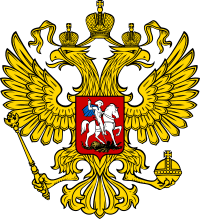Federal Assembly (Russia)
| Federal Assembly Федеральное Собрание Federalnoye Sobraniye | |
|---|---|
 | |
| Type | |
| Type | |
| Houses |
Federation Council State Duma |
| History | |
| Founded | 12 December 1993 |
| Preceded by |
Supreme Soviet of Russia Supreme Soviet of the Soviet Union |
| Leadership | |
|
Valentina Matviyenko Since 21 September 2011 | |
| Structure | |
| Seats | 620 (450+170) |
 | |
Federation Council political groups | Non-Partisan (170) |
 | |
State Duma political groups |
Government (342)
Opposition (104)
Other (2)
|
| Elections | |
| Chosen by territorial politicians | |
| Parallel voting | |
Federation Council last election | 12 December 1993 |
State Duma last election | 18 September 2016 |
State Duma next election | September 2021 or earlier |
| Website | |
| www.gov.ru | |
The Federal Assembly (Russian: Федера́льное Собра́ние, tr. Federalnoye Sobraniye; IPA: [fʲɪdʲɪˈralʲnəjə sɐˈbranʲɪjə]) is the national legislature of the Russian Federation, according to the Constitution of Russian Federation (1993). It was preceded by the Congress of People's Deputies of the Russian Federation and its Supreme Soviet.
It consists of the State Duma, which is the lower house, and the Federation Council, which is the upper house. Both houses are located in Moscow. The Chairman of the Federation Council is the third most important position after the President and the Prime Minister. In the case of incapacity of the President and the Prime Minister, the Chairman of the upper house of the Russian parliament becomes Acting President of Russia.[1][2]
The jurisdiction of the State Duma includes: consent to the appointment of the Chairman of the Government, deciding the issue of confidence in the Government, appointment and dismissal of the Chairman of the Central Bank, appointment and dismissal of the Chairman and half of the auditors of the Accounting Chamber, appointment and dismissal of the Commissioner for Human Rights, proclamation of amnesty, advancing of charges against the President for his impeachment and others.[3]
The jurisdiction of the Council of the Federation includes: approval of changes in borders between subjects of the Russian Federation, approval of the decree of the President on the introduction of a martial law or on the introduction of a state of emergency, deciding on the possibility of using the Armed Forces of Russia outside the territory of the Russia, appointment of elections of the President, impeachment of the President, appointment of judges of higher courts of Russia, appointment and dismissal of the Procurator-General of the Russian Federation, appointment and dismissal of Deputy Chairman and half of the auditors of the all Accounting Chamber and others.[4]
Powers
 |
| This article is part of a series on the politics and government of Russia |
As the Russian legislature, all laws must be voted in the Federal Assembly before they are signed into law. All bills, even those proposed by the Federation Council, must first be considered by the State Duma. Upon adoption by a majority of the full State Duma membership, a draft law is considered by the Federation Council, which has fourteen days to place the bill on its calendar. The Federation Council cannot make changes in bills passed by the Duma and can either approve or reject them. If the Federation Council rejects a bill passed by the State Duma, the two chambers may form a conciliation commission to work out a compromise version of the legislation. If two chambers cannot reach a compromise, or the Duma insists on passing the bill as is, the veto of the Federation Council can be overridden, if two thirds of the Duma's constitutional composition vote in favor of the bill.
The State Duma and the Federation Council usually meet separately. Joint sessions are organized when the President of Russia delivers his annual address to the Federal Assembly and in some other very rare occasions.
See also
References
- ↑ "Пост Председателя Совета Федерации РФ – это третий пост в стране. В случае недееспособности президента и премьера именно председатель верхней палаты парламента должен возглавить государство."
- ↑ "Почему у нас третье лицо в государстве Председатель Совета Федерации? Потому что это федерация, он не распускается, он действует постоянно." - Сергей Шахрай
- ↑ The Constitution of the Russian Federation. Article 103
- ↑ The Constitution of the Russian Federation. Article 102
External links
- Russian Federation Today — Official issue of the Federal Assembly (Russian)